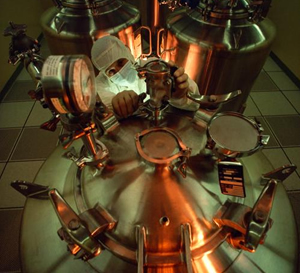- Home
- Products
- Process Measurements
- Extrel
- Fermentation Control
Fermentation Control
- General Details
- Overview
- Documents
The Extrel MAX300-IG™ Industrial Gas Analyzer has been installed in major manufacturing stages within pharmaceutical industries. One of the main applications is Fermentation process control.
In the fermentation process, the growth of bacteria and production of drugs takes place under very tight conditions. The aeration rate, temperature and dosage of nutrients are regulated very closely during several stages of the process. The Quadrupole Mass Spectrometer is used to provide full, fast and precise analysis of the incoming air and the off-gas from the Fermentor. The results are used to calculate the Respiratory Quotient (RQ), a major parameter in controlling growth and health of the bacteria. In different stages of a batch fermentation process, the RQ value changes, thus allowing for optimum and efficient drug production. The additional analysis of minor concentrations of by-products allow for rapid process adjustment to avoid undesired reactions.
One MAX300-IG Industrial Gas Analyzer is capable of analyzing up to 80 samples with the use of a single FAST multi-port valve. This multi-stream capability makes the Extrel MAX300-IG the economical alternative to infrared and oxygen analyzers installed on top of each Fermentor.
In the fermentation process, the growth of bacteria and production of drugs takes place under very tight conditions. The aeration rate, temperature and dosage of nutrients are regulated very closely during several stages of the process. The Quadrupole Mass Spectrometer is used to provide full, fast and precise analysis of the incoming air and the off-gas from the Fermentor. The results are used to calculate the Respiratory Quotient (RQ), a major parameter in controlling growth and health of the bacteria. In different stages of a batch fermentation process, the RQ value changes, thus allowing for optimum and efficient drug production. The additional analysis of minor concentrations of by-products allow for rapid process adjustment to avoid undesired reactions.

